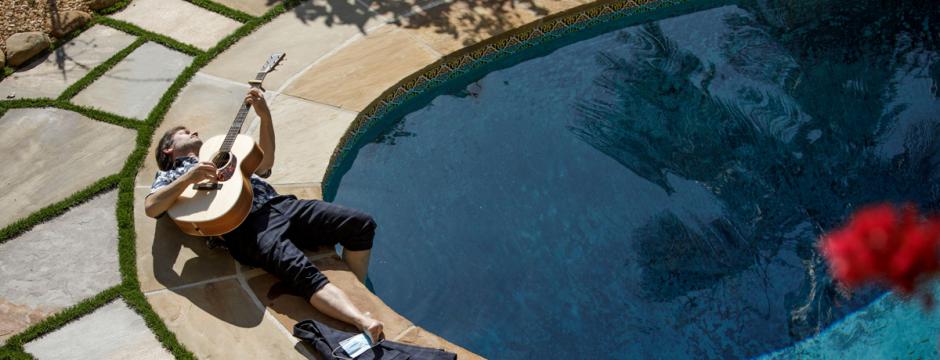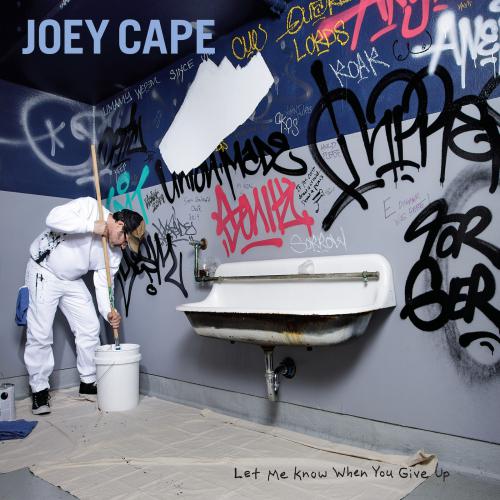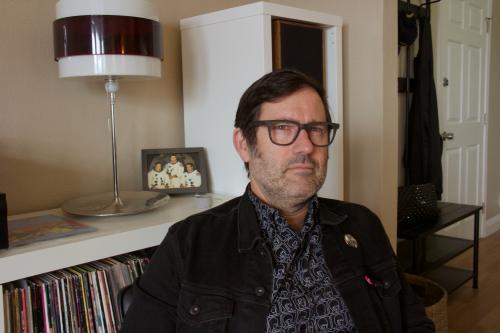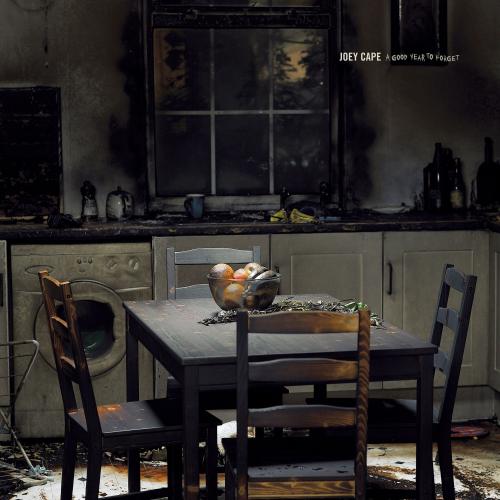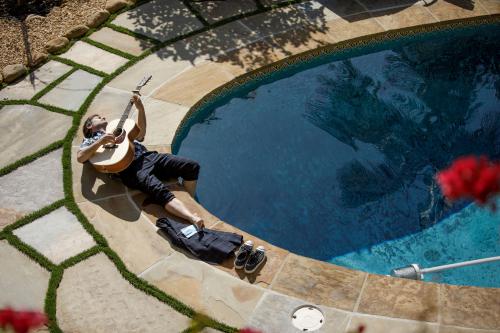Band: Joey Cape
Album: A Good Year To Forget
VÖ: 13.08.2021
Label: Fat Wreck Chords
Website: https://www.joeycape.com
When Joey Cape wrote his 2019 solo album, Let Me Know When You Give Up, he’d come to an important realization. “When I wrote that record,” he says, “I was going through a much-needed phase in my life where I needed to let go of stress and worries. It’s not really something you choose – it just happens. But then that time passed. And I didn’t want it to. Because nothing felt as precious as it did before.”
Little did he know that that moment would find its way back to him, and the entire planet, in the form of the pandemic. In February 2020, Cape was on tour in Australia with Lagwagon in support of their newest album, Railer, when the world effectively shut down. The band made it out of the country, he says, “by a hair,” and he immediately quarantined in a hotel when he got back to the States. Sitting alone in his hotel room, Cape had a lot to contemplate.
“My father had passed away at the very beginning of 2020,” explains Cape. “Then the pandemic hit, and I had also recently separated from my wife. I was on the phone with my mom one day, telling her how I didn’t know what I was going to do, and how I guessed I was going to live in this hotel until I ran out of money and she just said ‘Come home’. So I moved in with my mom and stepfather. It was just a really wild beginning to 2020 for me – I had things I had never experienced before all happening at once.”
The result is A Good Year to Forget, a record that encapsulates all the trials and tribulations of the 12 months that inspired it. “I felt a little strange at my age going to live with my parents again,” he says, “but it just made sense...they’re in their 80s and it was actually quite nice to take care of them and help them, to have that purpose and reacquaint in a deeper sense with my family. It’s actually been lovely.”
The time he spent with his parents didn’t just allow Cape to reconnect with them; it also afforded him time to write songs. Because recording studios were shutting down everywhere due to COVID, Cape got creative and turned the “cabana-type thing” he was living in into a home recording studio. “I just decided that if I was going to make a record like this I should make it in full isolation,” he says. “It’s really modest but it turned out to be great. I have a Murphy bed, so every morning I’d push up the bed, pull out the studio stuff, have some coffee or tea, get out my little chair and off I went.”
While his recording setup may have been modest, the result is a beautiful, warm record that captures the pure essence of its songs. Hushed and haunted, there’s an almost Nick Drakeian poignancy to these 12 songs,especially on the wistful “The Poetry of Our Mistakes” and the forlorn-yet-somehow-uplifting “Saturday Night Fever.” “Come Home,” a song inspired directly by the words his mother had spoken on the phone, is a beautifully melancholy, slightly folky tune full of hurt and longing that also manages to be reassuring at the same time. Elsewhere, “Under the Doormat” is a harrowingly beautiful ode to a lost love of the past. “Check Your Ego At The Door” is a ballroom lament steeped in timelessness, while “Fictional” is a scornful take on the false images and lives that proliferate on social media.
Despite Cape’s isolation while writing A Good Year to Forget, his fans will hear much more than just a voice, guitar, and bass on this record. Indeed, he ended up playing a plethora of instruments when recording the album, including electric and lap steel guitars, piano, mandolin, and drums. Additional final flourishes were added at fellow Bad Astronaut band member Thom Flowers’ studio and Sean McCue’s Coyote Road Studios, once everyone concerned had been vaccinated.
“I’d set out to make the first-ever folk record I’d ever made with just guitar, bass and vocals,” says Cape, “but, of course, when I got to the point where it was nearly complete, me being me I couldn’t resist. I could hear all these other instruments, like mandolins and lap steel. And then I got sick with COVID. I got very, very sick for a while. I had long-term effects and it was awful, and that put me down for a couple months. Once I recovered and went back to the record, I’d decided that I was going to put everything I wanted to on the record.”
As such, A Good Year to Forget finds the positive in the negatives to become a record of pure triumphant beauty. “I almost made a solo record alone,” he laughs. “But that great fun you have in collaborating with other people in the studio is just priceless. There’s always something positive you can find – something of redeeming value in an experience where there’s a struggle of suffering. I played everything because I reached a point where I realized that’s something I’d have to hold onto if it was going to be the record I wanted and set out to make. It forced things to be very basic, but I’m okay with that.”
Fat Wreck Chords will release A Good Year to Forget on Aug. 13, 2021.
Band: Joey Cape
Album: Let Me Know When You Give Up
VÖ: 05.07.2019
Label: Fat Wreck Chords
Website: https://www.joeycape.com/bio/
Joey Cape doesn’t want to call it an epiphany, but in recent years he’s come to a realization about life – specifically, the best way to live it. It’s a simple philosophy: even though we’re living in very troubled times, it’s important to not get bogged down by it all. That doesn’t mean you have to disengage with everything, but one’s survival and, by proxy, happiness both depend on being able to let go of everything a little bit. As he incorporated that mindset into his day-to-day life, it also got absorbed into the music he was making, and serves as the crux of Cape’s new solo album, Let Me Know When You Give Up. While the title itself might sound like it has negative connotations, its intention and purpose is anything but.
“If that sentence represents any philosophical sea change for me,” he explains, “it was a matter of electing Trump and, for many years before that feeling less and less hope for humanity and people. A number of things occurred to me throughout the last decade of my life, and I think the culmination was things like Brexit and Trump and a lot of these nationalist parties that are coming about in the world right now. People are becoming more and more terrified. I travel all the time for work and I see this everywhere in the world and I don’t like the way things are evolving. But the idea behind the title was more hopeful than negative. The phrase just came out of me at some point – I just said it, but what I meant was more like, ‘Hey – let me know when you give up and we’ll go grab a beer and talk about pizza!’”
To that extent, Let Me Know When You Give Up is both a response to and an antidote for this fearful, nationalist-friendly near-dystopia the world has found itself in. Cape insists his album is not offering a solution for the myriad problems infecting both the US and the rest of the world in 2019, but provides more a reflection of the mindset – that not-quite-epiphany – that’s helped him deal with everything that’s happening around him. One big change Cape made in his life was deleting himself from all social networks, because in a world stricken with extreme division, the right conversations aren’t being had.
“The idea is simplifying your life and letting go of the struggle,” he says. “Because this bubble that we live in – we have people on our side who all believe the same thing and there’s some debate and discussion but it’s not big picture stuff. That happens when our bubble collides with another bubble, and after a while it seemed a little bit sad that some of the basic ways to live are not being discussed as much as they should be. Bertrand Russell had the “three passions” – the hunt for knowledge, the need for connection and intimacy, and empathy and pity for human suffering. Those were the three passions that guided his life and they should be everyone’s basis, but there is so much debate out there. And you reach a point in your life when you realize that life is short. I’m an atheist and I think that this is it, so I want to enjoy myself and I want to enjoy the people I am surrounded by. I don’t want to talk about those things.”
At first, Cape would deliberately – and literally – drown out those debates and discussions. If he was out with a set of friends who started talking about politics, he’d surreptitiously slip a pair of earphones into his ears and listen to “a playlist of songs that I love – relaxing and beautiful melodies” while the discussion went on around him. That’s not to say he wasn’t paying attention to what was happening around him and staying informed, though. He was just choosing to shift his focus to the things that make him happy, rather than those that bring him down.
“I do think there’s an answer below all the noise,” he says, “and that there’s a very simple answer for what makes humans interact and the way that we affect the other species on our shared planet – there are some basic formative actions and ways to live that are close to morals, ways to live that do the least amount of damage. I’m still reading more than ever and I study my local politics and I still vote and I’m very much engaged when I need to be with things that matter to me. I just have a different philosophy about the overall pursuit and what’s important. And that’s not new – I’m just settled in it. It’s kind of a retirement plan.”
One specific but now-discarded retirement plan of Cape’s is captured in “Andalusia,” the album’s seventh track. Starting off as a gentle, melancholy acoustic tune, it slowly builds and builds in force and intensity, as if searching for something that can – and never will – be found. A powerful song about the realization that you’re powerless, it was inspired by the plan Cape had before he came to his current conclusions about how to live life.
“I wrote that song prior to the culmination of all these feelings I’d been having,” he explains. “There was this other side, and that other side was, ‘I’m simply going to disappear one day and it’s going to be kind of shitty for me to do this to people, but I know where I can go.’ Because everything overwhelms me – fuck this. I’d talk about it with my closest friends, how I knew where I could go and live inexpensively where there are beautiful beaches and great food and people are friendly and you speak about sad stuff and someone says “Hey, my friend, are you hungry?” That simple mode of living started to appeal to me and I had this idea in my head that this is what I’m gearing up for in the next couple of years. I’m going to disappear from the music thing and from everything and just let the closest people in my life know where I am. I’m already off the network, so I can just go off the grid and just tell a few people. I was enamored with the idea and I was planning for it and then I realized there’s something about that that’s more philosophical than it is actually literal. You don’t have to do it.” You simply live in that state of mind.
As such, this whole album serves as that philosophical escape. Recorded at a home studio built by Cape’s longtime friend, musical partner and lyrical collaborator Asher Simon, it’s the most expansive, accomplished and ambitious of Cape’s four solo albums to date. And while it’s a world away from the frenetic punk of Lagwagon, the band he formed in 1990, there are inevitable and unavoidable influences from that band too. The beautiful lilt of the title track soars with grace and hope, coming off almost like a more anthemic Dinosaur Jr. track, while “I Know How To Run” is a gloomy and lugubrious lament about the breakdown in communication – the ‘death of debate’, as he sings – that dominates contemporary political discourse.
Elsewhere, the country-tinged sway of “The Love Of My Life” and the driving and intense “Fighting Atrophy” both offer a blissful respite from the traumas and malaise of the outside world, while the insistent chug recalls a childhood sense of innocence that seems harder and harder to cling onto with each passing day. It all combines to make a record that captures that very spirit Cape has been relying on in recent years and which has transformed his approach to life. Now that Simon and his studio have entered Cape’s life, Let Me Know When You Give Up marks the start of a kind of renaissance for Cape and his music. Rather than give it all up, he’s going to be doing the very opposite.
“Now having the stability to do whatever I want in that studio,” he says, “I think it’s the beginning of an evolution for me, where I’m going to continue to make records and I’m going to do whatever I want. And I think that’s an evolution that’s just beginning for me and I love it and I can’t wait to get back in there and make more music that way. I’m very happy with music these days. I feel like I sorted things out very late in the game and that’s a bit of a bummer, but nonetheless I’m sorting things out and I couldn’t be happier.”
